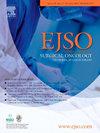The impact of colorectal cancer diagnosis and treatment on quality of life is increased in young patients
IF 2.9
2区 医学
Q2 ONCOLOGY
引用次数: 0
Abstract
Objectives
This study aims to assess the Quality of Life (QoL) in Early Onset Colorectal Cancer (EOCRC) patients compared to older CRC (OCRC) patients, addressing unique challenges and concerns and their impacts on QoL.
Materials and methods
A mixed-method approach was employed, including validated QoL tools (the WHOQOL-BREF, the EORTC QLQ-C30 and QLQ-CR29) and in-depth interviews. All patients completed a one-time survey regardless of cancer stage and treatment journey. Survey data was analysed using descriptive statistics with R version 4.3.1 and interview data was analysed using the Van-Manen method.
Results
Ninety-three patients completed the survey, comprising 53 EOCRC and 40 OCRC patients, of whom 10 from each group consented to the interview. EOCRC patients exhibited significantly lower scores in psychological aspects compared to the OCRC cohort (52.3 ± 20.5 vs 66.4 ± 15.8, p = 0.0009, WHOQOL-BREF). They also reported more severe emotional problems (34.6 vs 60.8, p = 0.0002, QLQ-C30), greater embarrassment about their condition (44.7 vs 27.4, p = 0.04), higher levels of anxiety (22.0 vs 49.2, p = 0.00007), more concerns about weight (35.2 vs 51.7, p = 0.04) and body image (41.7 vs 65.6, p = 0.001, QLQ-CR29) compared to their older counterparts.
The qualitative interviews identified three primary themes: headspace, physical impacts, and future. The challenges and effects on QoL experienced by younger individuals are clearly reflected in altered body image and psychological distress.
Conclusion
EOCRC patients face significant psychological and emotional challenges compared to OCRC patients, emphasizing the need for tailored support and intervention programs across the disease trajectory to address their unique challenges.
结直肠癌的诊断和治疗对年轻患者生活质量的影响越来越大
本研究旨在评估早期结直肠癌(EOCRC)患者与老年结直肠癌(OCRC)患者的生活质量(QoL),解决独特的挑战和问题及其对生活质量的影响。材料和方法采用混合方法,包括经过验证的QoL工具(WHOQOL-BREF、EORTC QLQ-C30和QLQ-CR29)和深度访谈。无论癌症分期和治疗过程如何,所有患者都完成了一次调查。调查资料采用R 4.3.1版本的描述性统计分析,访谈资料采用Van-Manen方法分析。结果共93例患者完成问卷调查,其中EOCRC患者53例,OCRC患者40例,每组10例患者同意接受访谈。与OCRC队列相比,EOCRC患者在心理方面的得分明显较低(52.3±20.5 vs 66.4±15.8,p = 0.0009, WHOQOL-BREF)。他们还报告了更严重的情绪问题(34.6比60.8,p = 0.0002, QLQ-C30),对自己的状况更尴尬(44.7比27.4,p = 0.04),更高水平的焦虑(22.0比49.2,p = 0.00007),更关心体重(35.2比51.7,p = 0.04)和身体形象(41.7比65.6,p = 0.001, QLQ-CR29)。定性访谈确定了三个主要主题:头顶空间、物理影响和未来。年轻人所经历的挑战和对生活质量的影响清楚地反映在身体形象的改变和心理困扰上。结论与OCRC患者相比,eocrc患者面临着显著的心理和情感挑战,强调需要在整个疾病轨迹中提供量身定制的支持和干预方案,以解决他们独特的挑战。
本文章由计算机程序翻译,如有差异,请以英文原文为准。
求助全文
约1分钟内获得全文
求助全文
来源期刊

Ejso
医学-外科
CiteScore
6.40
自引率
2.60%
发文量
1148
审稿时长
41 days
期刊介绍:
JSO - European Journal of Surgical Oncology ("the Journal of Cancer Surgery") is the Official Journal of the European Society of Surgical Oncology and BASO ~ the Association for Cancer Surgery.
The EJSO aims to advance surgical oncology research and practice through the publication of original research articles, review articles, editorials, debates and correspondence.
 求助内容:
求助内容: 应助结果提醒方式:
应助结果提醒方式:


